MADISON, Wis. – The Universities of Wisconsin Board of Regents today honored the 16th annual Regents Diversity Awards. These awards recognize individuals and programs that foster access and success for students who are members of historically underrepresented populations. Each recipient is awarded $7,500 to support professional development or continue the program being honored.
The Diversity Awards are “meant to recognize the outstanding contributions to diversity and inclusion by people and programs at our UW universities. These are ideals that we have promoted for decades,” said Regent Héctor Colón, chair of the Diversity Awards selection committee.
“This is an opportunity for us to reimagine how we do diversity, equity, and inclusion. Maybe we’ve taken a technical approach through the use of assessments, changing policies, or requiring training,” Colón said. “Could we shift our focus to getting to know one another, learning from one another, being willing to walk in one another’s shoes, demonstrating empathy, love, and care, and ultimately developing profound friendships. I am optimistic how we move forward with this in the future.”
This year’s winners include:
- Individual: Christine Smith, Professor of Psychology, Department of Psychology and Women’s, Gender, and Sexuality Studies, UW-Green Bay
“When I look at equity, diversity, and inclusion, EDI, be sure to add the ‘B,’ the belonging. That is the most important aspect of all this,” said Smith, who has served since 2008 in many capacities that have positively impacted equity and diversity at UW-Green Bay, including co-founding the Pride Center, coordinating Women’s History Month events, chairing the Women’s, Gender, and Sexuality Studies program for six years, and overseeing the creation of the LGBT certificate.
“As a social psychologist, everyone wants to belong, whether it’s the Pride Center, in the classroom, having events, or having a mentor who has their back,” Smith said. “Our students will thrive if given the opportunity.”
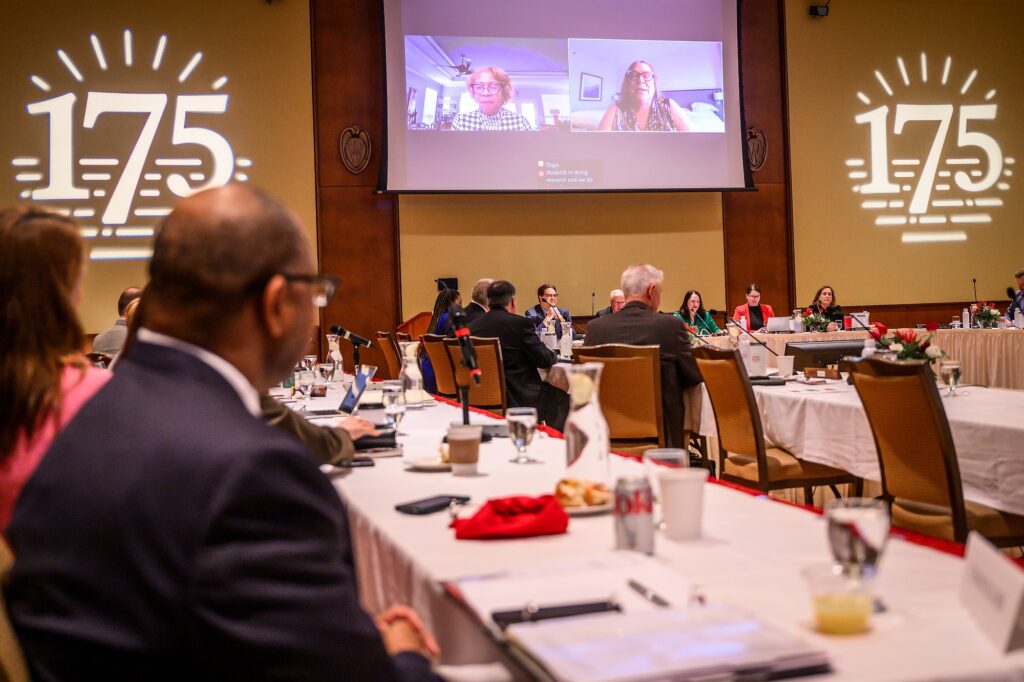
At right on screen, Dr. Christine Smith, professor of psychology, human development, and women’s and gender studies at UW–Green Bay, accepts a Regents’ Diversity Award during the UW Board of Regents meeting hosted at Union South at the University of Wisconsin–Madison on Feb. 9, 2024. (Photo by Althea Dotzour / UW–Madison)
- Individual: Provost Glendalí Rodríguez, Vice Chancellor of Academic Affairs, UW-Stout
Rodríguez said as a leader, she is always “trying to make sure everyone feels welcome because everyone at a university ultimately is an educator and all play a role in supporting student success.”
She told Regents she knows first-hand about being in the minority, not only as a child growing up in in the American south but also in her early years at UW-Stout when she was hired as an assistant professor in construction. “Starting on day one, I was the only female, the only Latina, and the only female faculty with a professional terminal degree,” she said.
“Persistence allows someone to do something even though it’s difficult or it’s opposed by other people. It takes persistence to champion EDIB,” Rodríguez said. “In the education sector, in my core I believe in how education opens opportunities. For those of you leading this work, know you’re not alone. Thank you for your persistence.”
Rodriguez has actively contributed to equity, diversity, and inclusion efforts during her more than 18 years at UW-Stout in positions ranging from all levels of professorship to department chair of construction to associate provost to provost.
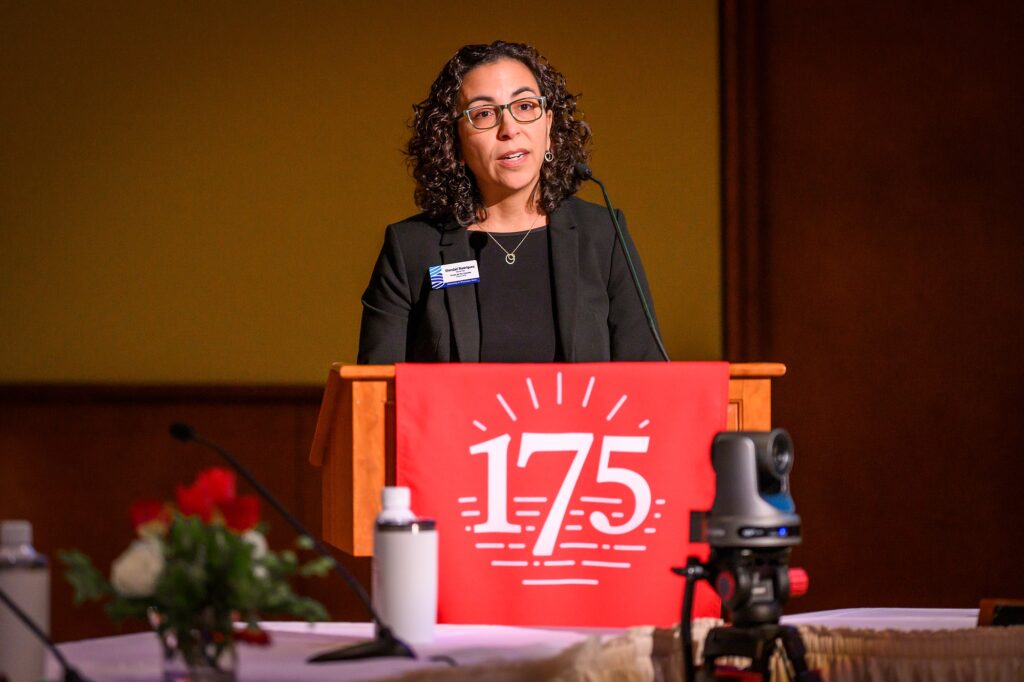
Glendalí Rodríguez, provost and vice chancellor for academic affairs at UW–Stout, speaks after receiving a Regents’ Diversity Award during the the UW Board of Regents meeting hosted at Union South at the University of Wisconsin–Madison on Feb. 9, 2024. (Photo by Althea Dotzour / UW–Madison)
- Program: Campus Garden Program, UW-Whitewater
Led by UW-Whitewater Sustainability Coordinator Wes Enterline, the Campus Garden Program has brought together students, staff, faculty and community members to support and serve individuals and families of the UW-Whitewater campus and surrounding community for more than a decade.
By addressing food insecurity, the program contributes to the well-being of underrepresented populations, first-generation students, and economically disadvantaged individuals on campus and in the local community.
“Investing in student success by providing a safety net is essential to closing the achievement gaps,” said Enterline, who noted that the trope of students living on ramen must be taken seriously. For students dealing with food insecurity, focus on their longer-term educational goals can shrink away, he said. “So many students silently drop out, thinking the experience wasn’t meant for them.”
Enterline said the garden also helps students understand the spirit of abundance and inspires civic engagement. “Many who once relied on our resources are inspired to give back. It plants the seed for future generosity.”
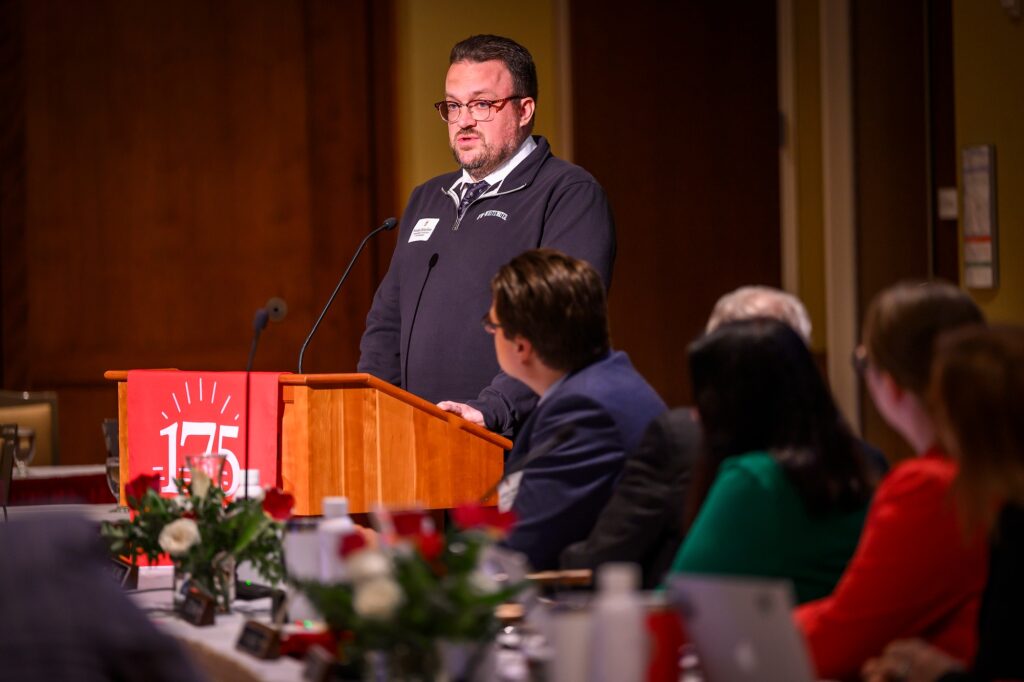
Wes Enterline, UW–Whitewater’s sustainability director, accepts a Regents’ Diversity Award on behalf of the university’s Campus Garden Program during the UW Board of Regents meeting hosted at Union South at the University of Wisconsin–Madison on Feb. 9, 2024. (Photo by Althea Dotzour / UW–Madison)
Other members of the Diversity Award selection committee included Regents Evan Brenkus, Joan Prince, and Ashok Rai.
UW-Madison spotlights student leader
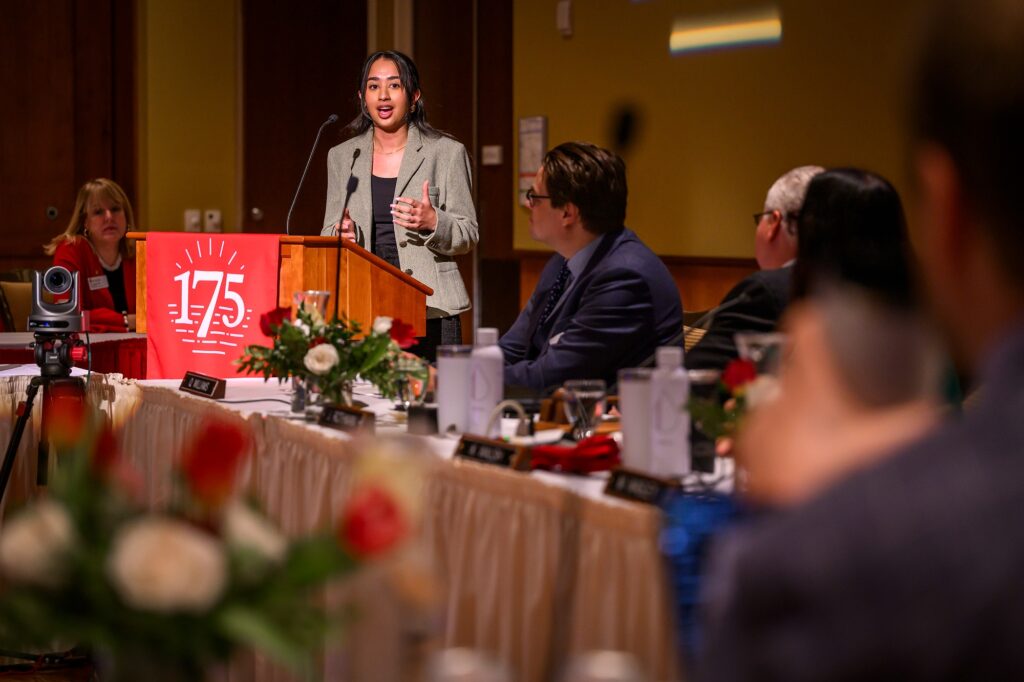
Amanpreet Kaur Sehra, Student Spotlight speaker and UW–Madison undergraduate student, speaks during the UW Board of Regents meeting hosted at Union South at the University of Wisconsin–Madison on Feb. 9, 2024. (Photo by Althea Dotzour / UW–Madison)
UW-Madison student Amanpreet Sehra, an undergraduate junior majoring in finance and real estate with a certificate in religious studies, spoke to Regents as part of the host campus Student Spotlight feature.
Sehra told Regents that growing up “people saw me only for the color of my skin” and she tended to keep part of her identity hidden.
She said the 2012 Wisconsin Sikh temple shooting in Oak Creek – 10 minutes from her house, where the victims could have been her own relatives – inspired her to want to educate others about differences as a way to build community, rather than just trying to fit in.
As a student at UW-Madison, she feels like her differences are embraced. She has been actively engaged not only with the Business School, but also the Center for Interfaith Dialogue and the Southeast Asian student community.
“I wanted to be able to connect with others on topics that I don’t feel like we talk about enough,” she said. “During these times, we must come together in support of each other and be open to communication and connection. We all have unique identities but we’re also part of communities.”
UW-Madison panel explores public-private partnerships
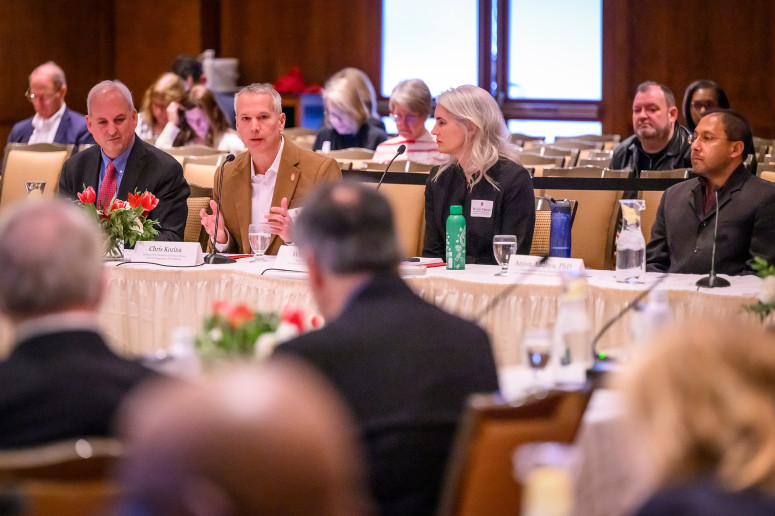
Chris Kozina, assistant vice chancellor and senior advisor on industry engagement in University Relations, spoke about strengthening public-private partnerships during a panel discussion at the UW Board of Regents meeting on Feb. 9. Photo: Althea Dotzour
Over the last several years, the federal government has increasingly put significant funding into programs for which major research universities like UW-Madison can play an important role. More than just developing new technologies and spurring innovation, these new funding programs focus not just on academic and industry partnerships but also expect outcomes related to job creation, regional economic transformation, community development, and equity considerations.
On Friday, UW-Madison convened panelists with experience in these expanded public-private partnership programs to share their perspectives with Regents on the recent growth of these funding opportunities, what it means for the future, the importance of participating in and learning from applying for these programs, and what is needed to compete more effectively in this space.
Panelist Jon Schnur highlighted how the landscape of private-public partnerships is changing, driven by this new wave of federal funding.
“The recipe for global economic success is different from where it was several decades ago and even several years ago,” said Schnur, who serves as chief executive officer of America Achieves, a nonprofit organization that incubates and supports large-scale initiatives to advance economic opportunity, mobility and pathways to good jobs and careers.
Several members of the panel emphasized the indispensable role universities like UW–Madison play as research engines and the strengths that comprehensive campuses in the Universities of Wisconsin can bring.
- For more coverage of the panel, see the UW-Madison news release: Ushering in a new era of innovation and economic growth
- See video of panel discussion (available soon)
In other business, the Regents:
- Heard a resolution of appreciation for UW-Madison hosting the February 2023 meeting;
- Approved modifications to the undergraduate application fee structure for all UW universities except UW-Eau Claire, UW-La Crosse, and UW-Madison. The approved structure will take effect on August 1, 2024;
- Approved UW-Eau Claire’s request for a Bachelor of Science in Professional Studies;
- Approved UW-Madison’s request for a Bachelor of Science in Design, Innovation, and Society;
- Approved UW-Stevens Point’s request for a Master of Social Work, an addition to the existing accredited Bachelor of Science in Social Work (BSW);
- Approved UW-Whitewater’s request for a Master of Science in Education (M.S.E) in Reading Instruction and Dyslexia Intervention;
- Approved two agreements that extend current relationships between UW-Madison’s Department of Athletics and its retail partners for an additional eight years each;
- Approved an agreement on behalf of UW-Superior’s Lake Superior Research Institute, which was awarded federal funding through the Great Lakes and Lake Champlain Invasive Species Program, to conduct research on the effectiveness of various ballast water filter solutions;
- Approved the UW System Status Report on Large or High-Risk Information Technology Projects;
- Approved the annual report on the Strategic Plans for Major IT Projects;
- Approved UW-Milwaukee’s request for authority to sell a 0.48-acre parcel of land improved with a single-family home located at 3435 N. Lake Drive, Milwaukee, Wisconsin;
- Approved UW-Madison’s request for authority to sell 514 SF of vacant land adjacent to the road right-of-way near the intersection of S. Whitney Way and Mineral Point Road for $5,400 based on an appraisal;
- Approved UW System’s request for authority to construct various all agency maintenance and repair projects, including the Science Building Roof Replacement at UW-Stevens Point and Recreational Eagles Center Climbing Wall Replacement at UW-La Crosse;
- Approved UW System’s request for authority to construct a minor facilities renewal project, including the Multi-Building Repairs and Renovation projects at UW-Madison’s Birge Hall, Brogden Hall and the Integrative Biological Research Building for the animal research program;
- Approved UW-Eau Claire’s request for approval to lease 154,372 square feet of space at Haymarket Landing apartment building for the purpose of student housing;
- Approved UW-Madison’s request for authority to construct the Camp Randall Sports Center Replacement and the demolition of the McClain Athletic Facility; and
- Approved UW-Stevens Point’s request for approval to increase Segregated Fees for the construction of Champion’s Hall Renovation and Addition project.
The Universities of Wisconsin Board of Regents will next meet on April 4-5, 2024, at UW-Platteville.
